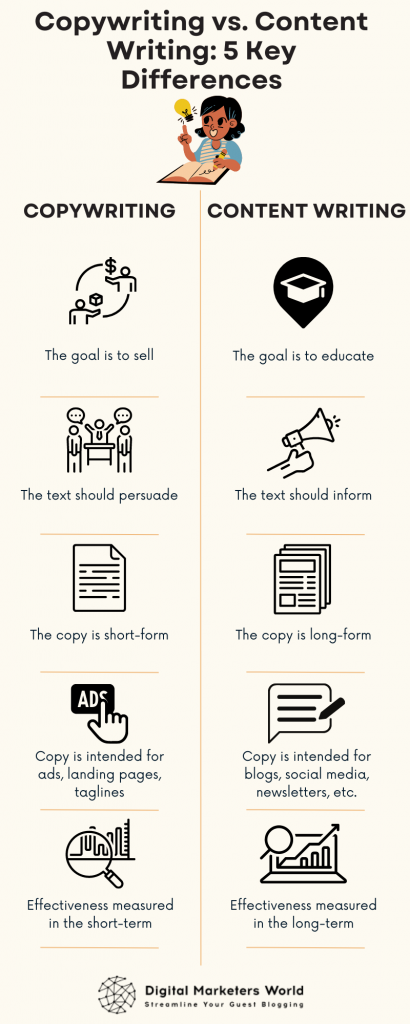Copywriting vs. Content Writing: Difference & Comparison Points
Content is an integral part of digital marketing, and as a marketer, blogger, or business owner, you work with content practically everywhere – from your ads to blog posts. Eventually, you’ll have to increase the volume of content to cover your marketing needs, which you can’t do without professional help.
But here’s a dilemma- should you hire a content writer or a copywriter? What do these terms mean? What is the difference between them?
We made a comparison guide to help you differentiate content marketing from copywriting and understand which expert you need to involve in your digital marketing campaigns and activities.
By the way, we have a great guide on digital marketing for those who are new to the field. You can start there first, then come back to this guide afterward.
What’s Copywriting?
Copywriting is about creating text and content for marketing and sales purposes. Experts in this field craft compelling ads, landing pages, social posts, or other pieces of “marketing content” (also known as marketing copy).
You can see marketing copy everywhere around you. Just open any website that offers products or services or look at the billboards on the streets. Every piece of text that meets the eye is purposefully crafted to catch your attention. Here’s one example from Amazon’s Fulfillment service website:

The professionals doing this type of writing are known as copywriters. These are professionals trained in creating a connection between the readers and your brand. They know what your audience is looking for and handpick words that hit their pain points. Their focus is on motivating readers to buy a product or sign up for a service.
We know what copywriting is, but how is it different from content writing? Let’s define the second one and go over their differences one by one.
What’s Content Writing?
Content writing is the process of creating informative and educational content, such as articles, guides, and blog posts.
Unlike copywriting, content writing is more about engaging your readers with content focused on educational value and making them want to return to your website for more. Here’s an example guide by monday.com that teaches you roadmapping:

Content writers will usually make long (up to several thousand words) articles that cover a selected topic in great detail. The reason for having that much details is to make your website an authority resource for that topic. Being an authority resource means that readers will return more to your website, and you will end up with stable organic traffic.
We gave you a short intro on what content writing and copywriting are. But you came for a more detailed comparison, right? Let’s begin with the core difference.
What’s The Main Difference Between Copywriting and Content Writing?
The main difference between copywriting and content writing is that a copywriter sells your products and services and represents your brand voice, while a content writer provides the readers with helpful information that also directly or indirectly mentions your brand.
More specifically, copywriting focuses on short-term sales and marketing. The message placement and the words that copywriters choose are all optimized to have more people click on the website’s “Buy Now” or “Sign Up” buttons.
Content writing is about long-term results. Companies create content that is interesting, educational, and useful for the readers. They want the audience to recognize and trust the brand.

For a more in-depth comparison, we have identified six main areas where copywriting and content writing differ from each other. Let’s begin with their types.
Comparison Point #1: Types & Forms
First, let’s understand what the deliverables for copywriters and content writers are. As they serve separate purposes, it is natural for these deliverables to be vastly different too.
Let’s list some of them.
Copywriting
Copywriting is closely associated with marketing and advertising activities. So you can find this type of content on anything that marketers make – from ads to website homepages.
These are some examples of copywriting:
- The motto and tagline of the company.
- The texts and visuals on banner ads and search ads.
- Ads on social media platforms (e.g., Facebook, LinkedIn).
- Organic posts and content that the company has on its social media channels.
- Subject lines and body text of both sales emails, email newsletters, and direct mail.
- Content for account-based marketing.
- Text of the Commercials on TV or radio.
- Podcasts.
- Press releases.
- Catalogs.
- All the content of a landing page or any other webpage, including call-to-action phrases and product/service descriptions.
Copywriters usually like to express their ideas and feelings in short messages. Mainly, it is because readers have a short attention span, and they will simply ignore long paragraphs of text. Sometimes there are technical limitations as well. For example, Google Ads limits headlines to 30 characters.
Content writing
Content writers’ deliverables are different. There is no need to create an urge and motivation to take action immediately. Instead, these are pieces of content that readers enjoy slowly.
These are some examples of content writing:
- Blog posts
- Case studies
- Guides
- Learning materials
- Comparison Guides
- News articles
- Books
- Whitepapers
Unlike copywriting, there are no limitations to the length of content writing. Usually, your guides and articles will be long-form and reach up to two to three thousand words.
Having long articles makes sense when we consider the purpose of content writing. You need to inform and entertain, so taking a granular approach and providing lots of information in your content is natural.
Take our guide as an example. You came here to learn the difference between copywriting and content writing. So you will appreciate it if we provide you with lots of explanations and details. We doubt you would like a 100-word description of how these two types of writing differ from each other.
As we know the types of content produced by copywriters and content writers, let’s understand what purpose their content serves.
Comparison Point #2: Purpose
If we take a bird’s-eye view of these two types of writing, they essentially serve the same purpose – to bring you more customers. However, the approaches that content writing and copywriting take to bring clients are not the same.
This contrast in approaches will be clearer to you when we compare the primary purpose they serve.
Copywriting
The main purpose of copywriting is to sell more of your products and services now.
We used the word “now” deliberately, as it is one of the main differences between copywriting and content writing. The goal of copywriting is to bring the result as soon as possible. If you have a social media ad or a banner ad, you will want people to click on it right after they see it.
The second part of the copywriting purpose is “selling”. The marketing copy aims to showcase the best sides of your products, make your brand and services look attractive and compelling so that more people come and make a purchase.
We like to use the term “pitching” to explain the purpose of copywriting as well. Essentially, you pitch your products or services to your potential customers and tell them you will ease their pains or cater to their needs.
Content writing
The main purpose of content writing is to build trust and long-term interest in your company or brand.
Content writing makes your brand more trustworthy by sharing valuable information and content with your audience. With content writing done right, your website visitors will either leave the site with positive impressions about your brand or will stay to read more interesting content on your website.
Content writing does still serve the purpose of increasing sales. But, unlike copywriting, it sells your products indirectly and “later” (unlike the “now” of copywriting). You will rarely see a website selling its products in its blog posts. Instead, they will share interesting stories, hoping you will love their brand and return in the future to make a purchase.
Overall, copywriting serves the purpose of selling now, while content writing aims to build long-term relationships with your audience.
But different purposes would also mean different tones and emotions in the message, right?
Correct. Let’s look at these differences in our next comparison point.
Comparison Point #3: Emotion & Tone
Talking to your audience with the right tone and emotions is critical. If you do it well, you will see a spike in purchases and conversions, as around 95% of purchase decisions are based on emotions.
Let’s compare copywriting and content writing in terms of the emotions they evoke and the tone they use.
Copywriting
Copywriting is all about putting readers on an emotional roller coaster. You want people to act immediately and buy something from you, so you need to trigger the right emotions in them.
Depending on the product and situation, some emotions you will trigger are:
- Fear of missing out.
- Pain.
- Excitement.
- Pride.
- Comfort.
Here is an example of a marketing copy that gives customers a feeling of relief from the pain of manually making reports.

The tone in copywriting is usually energetic and exciting. Copywriters also want their content to be conversational and speak to you directly.
Content writing
Unlike their counterparts, content writers do not care about evoking emotions in their readers. They care about how well they can immerse their readers into the article or blog post.
Here, having an emotionally calm and engaging message is a better choice. Take a look at an example of an educational article.

Did you feel the tranquil tone and neutrality in the text?
In terms of the tone, content writers prefer an informative style over conversational, as the informative tone is more enticing.
As we see, the tone and emotions are different for copywriting and content writing. The first one focuses on powerful emotions, while the second one is more mild and immersive. Our next point to compare is the importance of grammar and vocabulary. Let’s see how they diverge there.
Comparison Point #4: Grammar & Vocabulary
Is grammar important in marketing? All of us will agree that grammar is essential everywhere. However, there are cases when writers intentionally leave grammatical mistakes in the copy.
Content writing and copywriting are different in the importance of grammar and their use of vocabulary, too.
Copywriting
The effectiveness of copywriting does not depend on grammar. If you have made an ad with grammatical errors, but many people click on it, then it is a good ad with good content.
Sometimes you even need to make mistakes on purpose. For instance, some platforms have character limits for the sales copy (e.g. Google Ads has a 30 character limit on headlines). So, if your message is longer than these limits, you might need to remove some words from the copy to fit it in, even if your message becomes grammatically incorrect.
The vocabulary of copywriting is specific as well. Copywriting prefers more informal words. Sometimes you might also see professional jargon and even slang in a marketing copy. All of this is acceptable as long as the copy sells your products successfully.
Content writing
Unlike copywriting, content writing requires perfect grammar.
Grammatical mistakes in articles or guides can hurt your credibility. With errors in your content, you can leave the impression of a company with a low-quality bar. Your readers might even abandon your site and never return.
Vocabulary-wise, content writing prefers more formal words and terms. You can rarely find any jargon or slang in this type of content.
So, let’s sum up: following grammatical rules is important for both copywriters and content writers. But copywriters might sometimes face situations when they have to leave mistakes to fit their content.
Now we have reached the more technical differences between copywriting and content writing. In particular, we need to understand their effect on SEO.
Comparison Point #5: Search Engine Optimization (SEO)
Search Engine Optimization is a critical part of your website’s growth.
The content you have on a web page, its quality, and the topic it covers are crucial factors for the search engine to decide in which search results you will appear and how well it will rank you. So SEO crosses paths with both content writing and copywriting.
Copywriting
Search Engine Optimization is less critical for copywriting.
If your marketing copy is the content of a web page (e.g. your homepage or a landing page), then SEO applies to you. You want your landing pages or your service page to rank on Google and be accessible to people searching for these pages. The same goes for ad copies.
However, if you are making non-digital marketing content like billboards or brand taglines, then Search Engine Optimization is not relevant for you.
Content writing
Content writing is where Search Engine Optimization becomes essential.
Content writing is a popular way of improving your website’s SEO rankings thanks to these factors:
- It has informative content, which offers high value to readers.
- It has informational search intent (unlike the commercial intent of landing or service pages).
- The content is longer. Long-form content performs better in terms of rankings than short-form content.
When writing a blog article or a guide, a content writer will consult with the digital marketing team to include the right keywords and links in its best content to ensure that this guide appears on the search results.
SEO is a critical part of content writing. For copywriting, on the other hand, SEO is either important or irrelevant, depending on what you are making.
We have reached the last aspect where content writing and copywriting differ from each other – their effect on your sales and marketing.
Comparison Point #6: Effectiveness
Which one is more effective, content writing or copywriting? Both are effective but in different ways. So it will be an apples-to-pears comparison if we want to know which one performs better.
Experienced marketing teams usually employ both copywriting and content writing to take advantage of the benefits of both.
Copywriting
Copywriting is usually a short-term approach to getting results.
If you remember from the “purpose” section, it motivates readers to take immediate action and buy your products. So you should not expect people to constantly return to your website solely based on your marketing copy.
Content writing
Content writing is a long-term approach. Since content does not do any direct selling in this case, the chances are slim that your readers will immediately go to the products page and buy something.
Instead, you share lots of interesting articles with the readers and become a trustworthy source for content. As a result, people return to your website regularly, and you build steady organic traffic.
The industry’s best practice is to combine content writing with copywriting. You build organic traffic with content writing, generate leads, and convert them into paying customers with copywriting.
This was the last point of comparison. Now you have a good idea of what content writing and copywriting are and what makes them different from each other.
Now Over to You
Content writing and copywriting are both great marketing strategies in the hands of a skilled marketer. Modern teams are using both approaches in tandem as part of their content strategy to increase their short-term conversions while ensuring long-term stable growth.
We hope you found our comparison guide useful.For more engaging content on digital marketing, visit our blog.
Frequently Asked Questions (FAQs)
Q1. Which is more profitable copywriting or content writing?
Content writing is easy to start and has a steady income. On the other hand, copywriting earns more money if you are a pro with years of experience.
This was a simplification, though. Many factors can affect the income rate, such as the years of experience, the type of content creation you do, your employer, etc.
Q2. Can a content writer become a copywriter?
Yes, a content writer can become a copywriter, but they need to learn copywriting skills, such as interviewing, strong empathy, etc.
These two professions share most of their skill set. However, as copywriting is more emotion-driven, you need to pass the right emotions to your readers with your copy.
Q3. What is the difference between content and copy?
The main difference between content and copy is that copy refers to the content specifically used for sales and marketing purposes, while content refers to all formats of text, including the copy itself.

Sona Kalantaryan is a senior digital marketer with a creative past. Big fan of high cinema and well-optimized landing pages. She authors guides by sharing the best practices and does it the right way!
